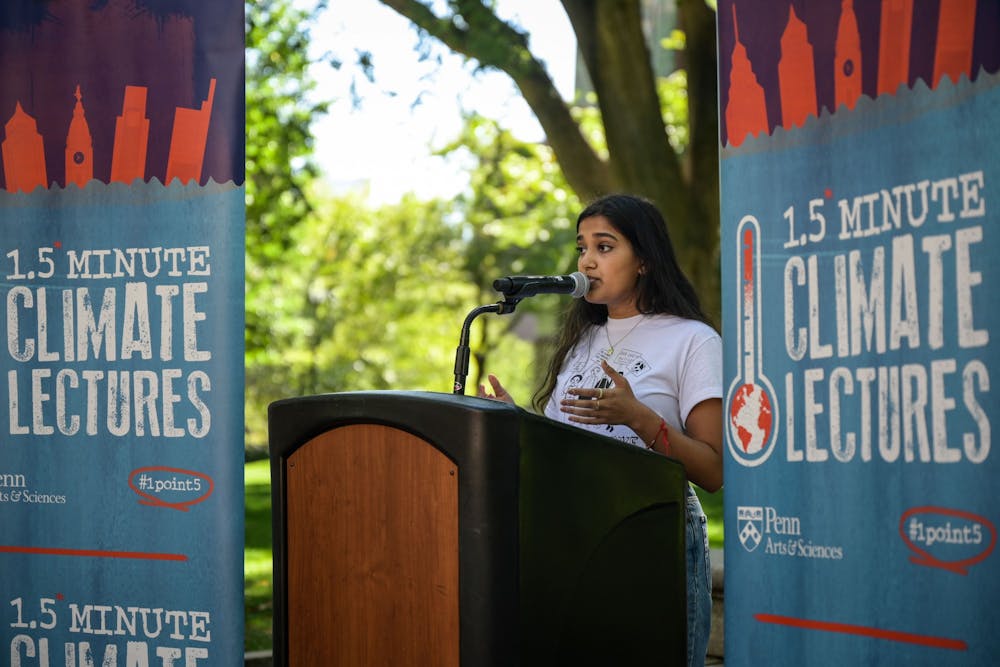2021 was shaped by increased global warming-related disasters, student and faculty pressure on Penn to divest from fossil fuels, and new climate commitments by Penn and other Ivy League universities.
Penn's climate-related initiatives ranged from its commitment to net-zero greenhouse gas emissions by 2050 to its second annual Climate Week, and most recently, its decision to halt new investments in fossil fuels. While student groups praised some of these actions, they criticized Penn for stopping short of full divestment.
Feb. 18 — At a University Council Open Forum, student activists demanded that Penn fully divest from fossil fuels and increase climate education efforts. Topics discussed ranged from mitigating local climate risk and supporting environmental justice issues, to calling for a required climate change course and full divestment.
April 7 — Penn announced its endowment will achieve net-zero fossil fuel emissions by 2050. Students criticized this move for stopping short of complete divestment from fossil fuels.
April 8 — Executive Vice President Craig Carnaroli criticized Fossil Free Penn’s efforts to communicate with the administration. Carnaroli claimed FFP was too concerned with divestment rather than other methods to achieve sustainability.
April 28 — The Student Sustainability Association at Penn collaborated with Penn’s Undergraduate Assembly and drafted a resolution which all eight Ivy League student governments signed. The resolution called for their universities to achieve complete divestment by the fiscal year 2025.
Sept. 11 — Harvard University announced their plans to let remaining investments in fossil fuels expire. At Penn, spokesperson Stephen MacCarthy declined to comment on whether the University will follow suit.
Sept. 14 — Penn professors and climate experts reflected on the events of this year's International Panel on Climate Change, which formally recognized human activity to be the leading cause of global warming. Philosophy Department Chair Michael Weisberg will contribute to the report’s second installment.
Sept. 20 — Penn hosted its second annual Climate Week, which offered over 45 in-person and online events from Sept. 20 to Sept. 24 and emphasized intersectionality. The keynote event approached climate justice through a feminist lens, in a dialogue with Ayana Elizabeth Johnson and Katharine Wilkinson, who are co-editors of "All We Can Save," an anthology that consists of writings by 60 female climate pioneers.
Other offerings included 1.5 Minute Climate Lectures, which are based on the School of Arts and Sciences' 60-Second Lecture series and named to emphasize 1.5 degrees Celsius — the maximum average temperature threshold before humans face the extreme consequences of climate change.
Oct. 10 — Dartmouth College announced its plan to divest from fossil fuels, joining Brown University, Columbia University, Cornell University, and Harvard University in their pledges to divest.
Oct. 22 — Penn faculty called for bolder climate action and fossil fuel divestment. A subcommittee of the Faculty Senate released a resolution in September that aimed to raise more awareness of climate-related issues among University departments.
Nov. 9 — Penn announced in an email that the University will halt new commitments to private equity vehicles dedicated to investments in fossil fuel production — a step further than its prior decision to no longer make direct investments in companies engaged in the production of fossil fuels.
The University’s top administrators cited the United Nations Intergovernmental Panel on Climate Change's August report — which warns that many of climate change's impacts are now irreversible — as a primary reason for the policy change.
Student groups criticized the move for stopping short of divestment and shared mixed reactions. Engineering senior and Fossil Free Penn coordinator Ari Bortman said that Penn's announcement was "not a [pledge of] divestment in any sense," while College senior Vyshnavi Kosigishroff, one of the co-chairs of the Student Sustainability Association at Penn, said that the move resembled "partial divestment."
Dec. 7 — Penn Sustainability released their most recent financial year report reviewing the Climate and Sustainability Action Plan 3.0. The report indicated improved carbon emissions, with a reduction of 44.3% since 2009, and the continued advancement of the Environmental Innovations Initiative, which seeks to connect environmental teaching and research across the University's 12 schools.









